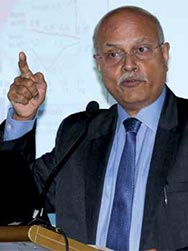
We Don’t Need All This Darkness!
In hearing Rtn. Shailesh Haribhakti’s analysis of the 2018 Budget, there were only two instances when laughter prevailed. The first instance was when he was introduced by a fellow rotarian: “Shailesh Haribhakti needs no introduction!” This, the speaker acknowledged as “the most memorable introduction.” And the second uproar was heard when the lights were dimmed – for some odd reason – forcing the speaker to say, “We don’t need all this darkness.” However, he began on a sombre note that lingered on till the very end.
“We’ve seen a precipitous decline in our stock markets. To lose a thousand points in a day can shake up almost anybody.” “Yet we must ask ourselves,” he said, “is it because of the budget, or factors beyond our shores?” After all, “the world is growing at the fastest rate in the last five years,” and, as a result, interest rates will rise. Although as “this has driven the equity markets into a tailspin” the world over, India suffers a “double whammy,” which is the result of the Long-Term Capital Gains Tax and “a complete change in the international context.” Our markets are now facing the outcome of these complex circumstances.
However, the silver lining is “the manufacturing index, agricultural index, and services index are all rising.” To give them further impetus, one must get the answer to a very pertinent question: “How is India saving?” The past president says, “55% of the entire stock of India (4 trillion of 7.5 trillion USD) is invested in real estate. Only 3.4% is invested in equities.” These revelations put Rtn. Shailesh Haribhakti’s analysis of the budget into perspective.
He further informs us that “a matter of grave concern is that the saving rate in India is falling every year.” The reason for his concern is the longstanding belief among economists that savings fortel the investments of the future. As far as the future is concerned, we must move on to “the four things that really happened in this budget.”
Upliftment of the agricultural sector was number one. By formalising the Indian economy – a result of Aadhar, GST, and demonetisation – every family in India has a bank account. Now, any economist would conclude that such a formalised economy would allow goods and services to grow, but the speaker makes a more specific conclusion. “It will be possible for every farmer in every remote part of the country to know what is the movement of the price of an agricultural commodity.” And farmers will thus be in a position to make a decision based on that knowledge.
“For the first time I heard in a speech that blackboards must be converted into dashboards,” pointed out the speaker, highlighting the second “assumption” of the budget before moving on to the third – healthcare.
ModiCare was keenly explained due to popular demand: “It’s a huge attempt to transform what is available to us today.” The healthcare scheme reads that 60% of the need for the insurance pool will be met by the central government, 40% will be met by the state government: “It is quite likely that hospitalisation for major ailments will be possible up to 5 lakhs for everybody who is in this insurance pool (10 crore rural families).”
Lastly, a boost to small and medium enterprises, by reducing their tax to 25%, is likely to result in income generation. Thereafter, “we should see the possibility of more people being hired.”
Whether these four features of the budget are “assumptions,” only time will tell, but what it revealed to us by then was that Rtn. Shailesh Haribhakti had far exceeded his time limit, without losing our attention for even a second.
